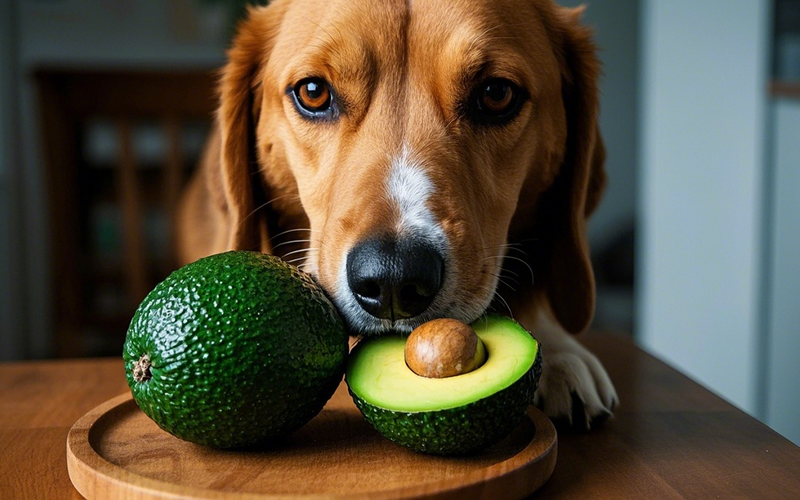Can Dogs Eat Avocado? The Good, the Bad, and What You Need to Know
- 25 Mar 2025 10:50
Avocado is a popular and nutritious fruit for humans, packed with healthy fats, vitamins, and antioxidants. But when it comes to feeding it to your dog, you may be wondering: Is avocado safe for dogs? The answer isn’t entirely straightforward, as parts of the avocado can be harmful to dogs, but small amounts of flesh (the edible part) can be safe if prepared properly.

The Risks of Avocado for Dogs
1. Persin – A Toxic Compound
Avocados contain a natural toxin called persin, which is present in the skin, pit, and leaves of the avocado plant. Persin can cause gastrointestinal upset and other health issues for dogs. It can lead to symptoms like vomiting, diarrhea, and in more severe cases, heart issues or difficulty breathing. The highest concentration of persin is found in the skin and pit, so never feed these parts to your dog. 🥑⚠️
2. The Pit – Choking Hazard
The pit of an avocado poses a serious choking hazard for dogs. Not only is it large and hard to digest, but it can also cause an intestinal blockage if swallowed. If your dog manages to swallow the pit, it could get stuck in their digestive tract, which may require surgical intervention to remove it. Be sure to remove the pit before offering any avocado to your dog. 🐾
3. High in Fat
Avocados are relatively high in fat, particularly healthy monounsaturated fats. While fats are an essential part of a dog’s diet, too much fat can lead to obesity and may contribute to pancreatitis (inflammation of the pancreas). Overfeeding avocado could cause digestive upset and lead to weight gain if given regularly. Moderation is key when offering avocado to your dog. 🍽️
Can Dogs Eat Avocado Flesh?
Yes, in small amounts, the flesh of the avocado can be safe for dogs. The flesh contains healthy fats, fiber, and several vitamins (such as vitamin E, vitamin K, and vitamin C), which can support your dog’s health when fed as an occasional treat. Some pet owners also use avocado as a natural moisturizer for dry skin or a remedy for dry noses in dogs. However, the key is moderation—only a small portion is recommended.
How to Safely Feed Avocado to Your Dog
If you’d like to offer avocado to your dog, here’s how to do so safely:
Remove the Pit and Skin
Before offering avocado to your dog, always remove the pit and skin. These parts are toxic and dangerous for your dog. The only part you should feed your dog is the soft, creamy flesh of the avocado.Offer Small Portions
Start with a very small amount (about one to two tablespoons for a medium-sized dog) to see how your dog reacts. If your dog has never had avocado before, it’s important to introduce it slowly and in moderation to avoid any digestive upset.Avoid Seasoning or Additives
Never feed your dog avocado that has been seasoned or mixed with other ingredients, such as salt, garlic, or onions, which are toxic to dogs. Always offer plain, unseasoned avocado.Monitor for Reactions
As with any new food, keep an eye on your dog after feeding them avocado. If you notice any signs of upset stomach, vomiting, or diarrhea, stop feeding avocado and consult a pet health professional.
What to Do If Your Dog Eats Avocado Pit or Skin
If your dog eats the pit or skin of an avocado, it could lead to a choking hazard, intestinal blockage, or toxicity from persin. Here’s what you should do:
Monitor for Symptoms: Watch for signs of gastrointestinal distress, including vomiting, diarrhea, lack of appetite, or abdominal pain.
Seek Professional Help: If your dog ate the pit or skin and shows signs of distress, contact a pet health professional immediately. You can also use PettureX for 24-hour online consultations to get quick advice on what to do next. 📱
The Bottom Line: Can Dogs Eat Avocado?
Yes, small amounts of avocado flesh are generally safe for dogs, provided you remove the pit and skin. Avocado contains healthy fats and vitamins, which can be beneficial for your dog’s health when given in moderation. However, avoid feeding your dog the pit, skin, or any other parts of the avocado plant, as these can be harmful or toxic.
As with any new food, it’s important to introduce avocado gradually and observe your dog for any adverse reactions. If you're ever in doubt, consulting a pet health professional is always the best choice.
For immediate advice and guidance, consider using PettureX, a pet health software that offers 24-hour online consultations and expert support! 🌟
Related

Crunchy Curiosity: Can Dogs Safely Snack on Pork Rinds? A Deep Dive
- 21 Apr 2025
Pomegranate Seeds and Pooches: A Deep Dive into Whether Dogs Can Safely Indulge
- 21 Apr 2025
Can Dogs Eat Peaches? Vet Explains Benefits, Cyanide Risks & Safe Serving
- 16 Apr 2025
Can Dogs Eat Mulberries? Vet Explains Safety, Benefits & Potential Risks
- 16 Apr 2025
Can Dogs Eat Mozzarella? Vet Explains the Cheesy Truth (Risks & Benefits)
- 16 Apr 2025
Can Dogs Eat Mango Skin? Vet Explains Why It's a Risky Chew!
- 16 Apr 2025
Can Dogs Eat Maple Syrup? The Sugary Truth & Why Vets Advise Against It
- 16 Apr 2025
Can Dogs Eat Mac n Cheese? Vet Explains Why This Comfort Food Is Unsafe!
- 16 Apr 2025
Can Dogs Eat Liver? Vet Guide to This Nutrient-Dense Organ Meat (Benefits & Risks!)
- 16 Apr 2025
Can Dogs Eat Lamb? Vet Insights on This Nutritious Meat Option
- 16 Apr 2025
